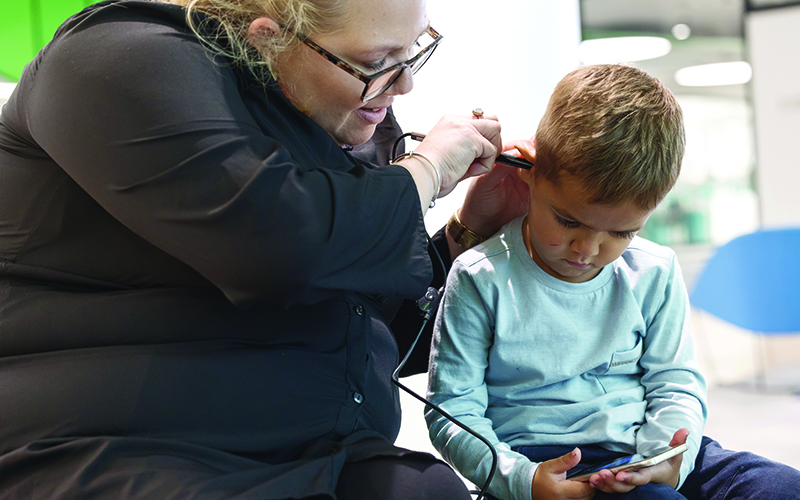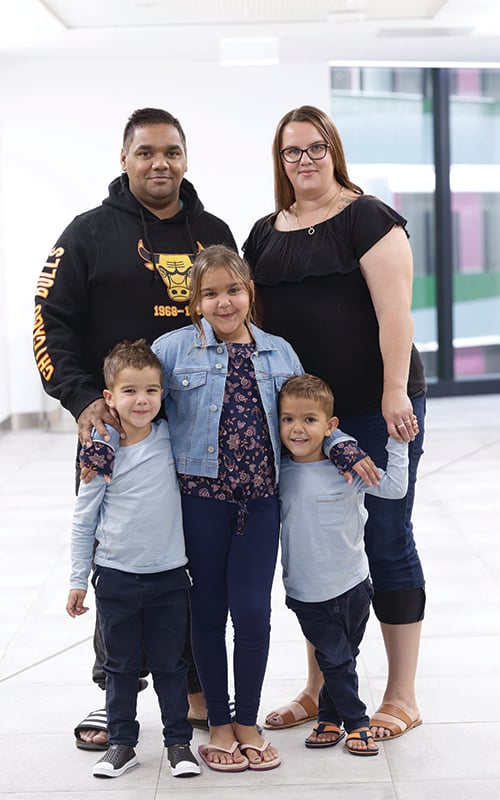
Natasha Morrison checks Jahkye’s ears
Debilitating yet preventable middle ear infections in Australian children disproportionately affect certain groups, including young Aboriginal children.
Left untreated, these infections can lead to permanent hearing loss and affect language, education and quality of life – but waiting times for treatment can be brutal, with many kids having to wait up to two years to be seen. Now, an innovative The Kids program is helping to slash waiting times so children can have their ear problems checked within days.
Among childhood’s universal milestones are first words – what was it and when was it said? While many families may argue over whether it was ‘mama’ or ‘dada’, for parents of children with middle ear infections and hearing loss, these questions can be met with sadness.
It’s a story that’s easily recognisable for Nikki Naylor, Jahkye’s mum. “I had two children with no ear issues so when bub had his newborn hearing screening, I wasn’t expecting any problems,” Nikki said. “It turns out he had glue ear, which was the start of ongoing issues.” At 14 months, Jahkye had his first lot of grommets. “Before surgery he was not able to say ‘Mum’ due to his hearing loss – his talking and hearing was not that of a 14-month-old,” Nikki said.

Middle ear infections in Australia are common among children, but they disproportionately affect certain groups. A The Kids study found that young Aboriginal children are at increased risk of developing middle ear infections compared to non-Aboriginal children.
Dr Chris Brennan-Jones, Head of Ear Health at the Wesfarmers Centre of Vaccines and Infectious Diseases, based at The Kids Research Institute Australia, said the results clearly demonstrated the urgent need to prioritise early testing and treatment for Aboriginal children suffering otitis media (OM).
“Some children spend over two years on waiting lists for treatment of ear infections. That’s too long for children who are in crucial stages of language, behavioural and educational development,” Dr Brennan-Jones said.
“Working with the local Aboriginal community, the Djaalinj Waakinj (listening and talking) Ear Portal Program was established to address this gap. It ensures access to early diagnosis and intervention – within days instead of years – by reducing unnecessary travel and waiting times.”
The Cockburn-based project is a telehealth-driven clinical research program which uses technology to remotely diagnose and prioritise treatment of children with otitis media to prevent hearing loss. More than 150 children are currently enrolled in the South Metropolitan project, but a generous donation from globally-recognised ship-building firm Austal – matched by a private benefactor – will enable the program to significantly increase the number of children seen each year.
Just like The Kids, Austal – also based in the Cockburn area – is committed to helping the communities where we live and work.
“By supporting the Djaalinj Waakinj Ear Portal Program, Austal will make a real impact for local families and help ensure no child in the local community starts school with preventable or treatable hearing loss,” said Val Swift, Aboriginal Cultural Governance Advisor at Wesfarmers Centre of Vaccines and Infectious Diseases.
Hearing loss caused by untreated OM is a lifelong burden, with the impact on lost wellbeing (due to unemployment, impacts on mental health and quality of life) estimated to cost $17.4 billion per annum in Australia.“There is an assumption that living in metropolitan Perth means you can access medical services without restrictions. But that isn’t the case for many Aboriginal families,” Ms Swift said.
“By working with the community to design and deliver the program, we’re ensuring the cultural security of the program so families feel safe and comfortable to participate,” said Natasha Morrison, Aboriginal Research Assistant with the Djaalinj Waakinj program. “We’re making this a service they can access without restrictions.”

The Djaalinj Waakinj (listening and talking in Noongar language) Ear Portal Program was co-designed and governed by an Aboriginal Community Advisory Group in partnership with:
- The Kids Research Institute Australia
- Perth Children’s Hospital
- Cockburn Integrated Health and the WA Country Health Service
- Moordijt Koort
- Babbingur Mia
- Boodjari Yorgas
- CAHS Community Health
It has not only dramatically increased access to service and reduced the cost of treatment for families, but has increased family satisfaction with ear health care through the provision of culturally appropriate care.
Pictured: Dad Stephen Harris, Mum Nikki Naylor, Stephen Jnr, 4, Ataliyah, 8, and Jahkye, 3
Making a difference to kids' hearing all over the world
Globally, there are an estimated 31 million episodes of chronic suppurative otitis media (CSOM) every year, with 22 per cent of cases affecting children under five years of age. Prevalence varies widely between countries, but the condition disproportionately affects people experiencing socio-economic disadvantage.
Many people who are affected by CSOM do not have good access to specialised ear care – a significant problem that attracted the attention of Cochrane ENT, a global independent network of researchers, professionals, patients, carers and others which produces systematic reviews of healthcare treatments around the world.
In a bid to address the issue, Cochrane ENT prioritised the production of systematic reviews on non-surgical treatments for CSOM – a call that was met by Dr Chris Brennan-Jones, who led an international collaborative group to complete a total of seven reviews.
In a rare honour, these reviews were released as a ‘Special Collection’ to mark World Hearing Day 2021. Funded by the NHMRC, the reviews were profiled by the World Health Organization (WHO) and resulted in The Kids being admitted as a full member of the WHO World Hearing Forum in 2019. The team’s research was also cited in the WHO World Hearing Report 2021, informing the approach to prevention and treatment of otitis media globally.
